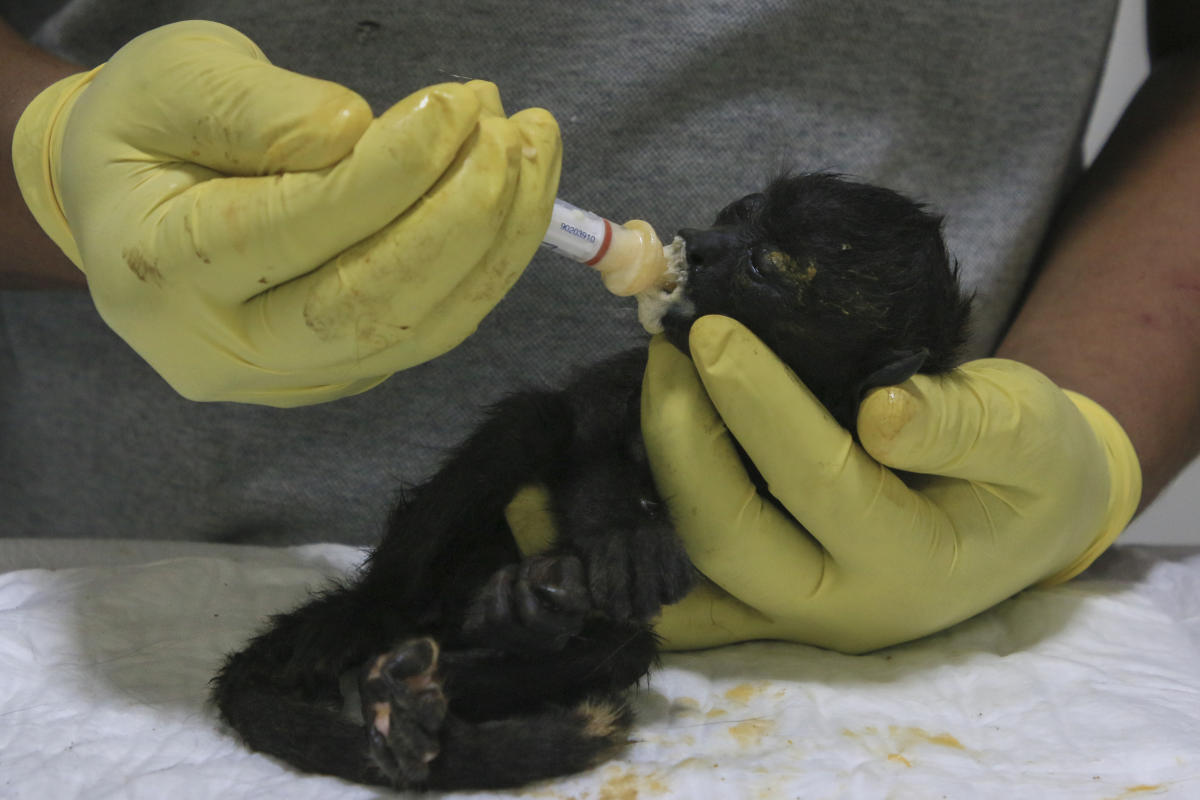MEXICO CITY (AP) — It’s so hot in Mexico that howler monkeys are falling dead from trees.
At least 83 of the medium-sized primates, known for their roaring vocal calls, were found dead in the Gulf Coast state of Tabasco. Others were rescued by residents, including five who were rushed to a local vet who fought to save them.
“They arrived in critical condition, with dehydration and fever,” said Dr. Sergio Valenzuela. ‘They were as limp as rags. It was heat stroke.”
While Mexico’s brutal heat wave has been linked to the deaths of at least 26 people since March, veterinarians and rescuers say dozens and perhaps hundreds of howler monkeys have been killed.
In the town of Tecolutilla, Tabasco, the dead monkeys began appearing Friday, when a local volunteer fire and rescue crew showed up with five of the creatures in the back of the truck.
Normally quite intimidating, howler monkeys are muscular and can grow to about two feet in length, with tails that are just as long. They are equipped with large jaws and a fearsome set of teeth and fangs. But most of all they are known for their lion-like roar, which belies their size.
“They (the volunteers) asked for help, they asked if I could examine some of the animals they had in their truck,” Valenzuela said Monday. “They said they had no money and asked if I could do it for free.”
The vet put ice on their limp hands and feet and connected them to IV drips with electrolytes.
So far the monkeys seem to be on the mend. Once lethargic and easy to handle, they are now caged in Valenzuela’s office. ‘They are recovering. They’re aggressive… they’re biting again,” he said, noting that’s a healthy sign for the normally stealthy creatures.
Most are not so lucky. Wildlife biologist Gilberto Pozo counted about 83 of the animals dead or dying on the ground under the trees. The die-off started around May 5 and reached its peak over the weekend.
“They fell like apples from trees,” Pozo said. “They were in a state of severe dehydration and died within minutes.” Pozo is already weakened and says that falls from tens of meters high cause extra damage, often killing the monkeys.
Pozo attributes the deaths to a “synergy” of factors, including high heat, drought, forest fires and logging, which deprive the monkeys of water, shade and the fruits they eat.
For people in the steamy, swampy, jungle-covered state of Tabasco, the howler monkey is a beloved, emblematic species; According to locals, the monkeys tell them the time of day by howling at dawn and dusk.
Pozo said locals – whom he knows through his work with the Biodiversity Conservation of The Usumacinta group – have been trying to help the monkeys they see around their farms. But he notes that this could be a double-edged sword.
“They fell from the trees and the people were moved. They went to help the animals and provided water and fruit for them,” Pozo said. “They want to take care of them, especially the baby monkeys, and adopt them.”
“But no, the truth is that babies are very vulnerable, they cannot be in a house where there are dogs or cats because they have pathogens that could potentially be fatal to howler monkeys,” he said, stressing that they need to be rehabilitated. and released into the wild.
Pozo’s group has set up special rehabilitation stations for monkeys – there are currently five monkeys in them, but birds and reptiles are also affected – and are trying to assemble a team of specialist veterinarians to get the primates the care they need.
Belatedly, the federal government acknowledged the problem Monday, with President Andrés Manuel López Obrador saying he had heard about it on social media. He congratulated Valenzuela on his efforts and said the government would try to support the work.
López Obrador acknowledged the heat problem – “I have never felt it as bad as this” – but he also has many human problems to deal with.
By May 9, at least nine cities in Mexico had set temperature records, while Ciudad Victoria, in the border state of Tamaulipas, recorded a sweltering 117°F (47°C).
Below-average rainfall this year across almost the entire country is causing lakes and dams to dry up, running out of water supplies and leaving authorities scrambling to supply water for everything from hospitals to firefighting teams. Low levels at hydroelectric dams have contributed to power outages in some parts of the country.
Consumers are also feeling the heat. On Monday, the national chain of OXXO convenience stores — the largest in the country — said it was limiting ice cream purchases to just two or three bags per customer in some locations.
“In a period of high temperatures, OXXO is taking measures to guarantee the supply of products to our customers,” parent company FEMSA said in a statement. “Limits on the sale of bagged ice cream should ensure that a greater number of customers can purchase this product.”
But for the monkeys it is not a matter of comfort, but of life and death.
“This is kind of a sentinel,” Pozo said, referring to the canary-in-a-coal-mine effect where one species can say a lot about an ecosystem. “It tells us something about what’s happening with climate change.”
____
Follow AP’s coverage of Latin America and the Caribbean at https://apnews.com/hub/latin-america
